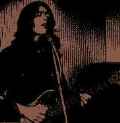 "Cradle Rock" and "A Million Miles Away." Not
that the others are lackluster, but simply that those two exemplify how
much better Gallagher sounds in concert.
"Cradle Rock" and "A Million Miles Away." Not
that the others are lackluster, but simply that those two exemplify how
much better Gallagher sounds in concert.All of the other tunes are new compositions. Of them, "Too Much Alcohol" is my favorite. It is a little more in the direction of traditional blues than the rest.
All of the songs, however, are in the blues vein, but they have just enough rock flavor. Gallagher's guitar playing shows a potpourri of styles from traditional, rural slide to more contemporary British screams. The mixture is tasty and satisfyingly interesting.
Gallagher's voice is not quite the equal of his picking, but it is strong enough not to distract from the music. In most cases, it even adds. Especially interesting is the album's fourth side, which features several jams pieced together to create a collage of boogie and blues themes. In one of them, Gallagher follows several of his guitar licks with his voice and thus makes for some of the most interesting interplay since Plant and Page got together.
Henry Keiluhn
